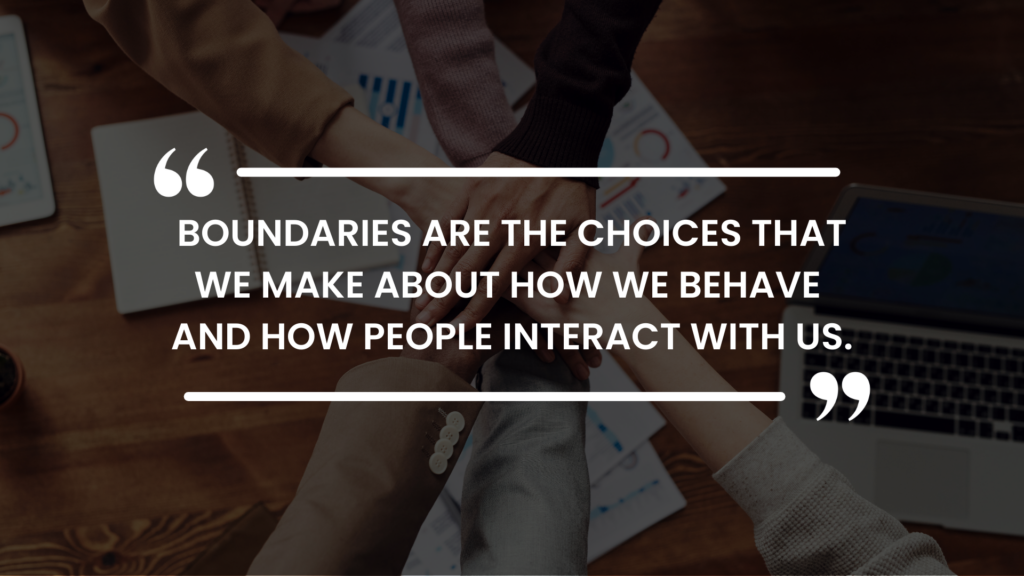Maintaining healthy boundaries is essential for your wellbeing and your team’s wellbeing. In a hybrid work context, boundaries are especially important, but can be challenging to uphold. Often, it’s not enough to turn off notifications; the nagging knowledge that you have a long to-do list and access to work at your fingertips is just enough for someone to ditch their evening self-care routine in favour of making just a little more headway on tomorrow’s workday.

Setting and upholding boundaries are an important key to team success! Read on to learn more about why boundaries are important and how to create a work culture that supports healthy boundary-setting.
What are boundaries and why are they important?
Recently, I attended the Self-Care Summit and was inspired by a talk from Zoe Shaw (a psychotherapist and motivational speaker) which focused on setting boundaries.
Shaw explains that boundaries are the choices that we make about how we behave and how people interact with us. They are decisions you make about what is good for you and what isn’t.

Boundaries look different for each person. For one person, it might mean no screen time before bed. For someone else, it’s scheduling a lunch hour away from the desk in their calendar every day. Boundaries also mean being able to say “no.”
How can I say “no” more often?
In his book Essentialism, Greg McCain talks about the importance of having a “no” repertoire; this means having different ways of saying “no,” or choosing what is essential and what can be let go.
It’s easy to get into the habit of saying “yes” to everything, which can quickly lead to overwhelm. Here are three tactics you might use to up your “no” game:
- Don’t respond to requests right away – simply pause. Think about whether the request is going to give you energy and whether it fits with your current list of priorities.
- “Let me check my calendar and get back to you.” This gives you time to review, reflect and make your decision.
- Use your autoresponder. When you need dedicated focus time (e.g., writing an important report), use your autoresponder to decline other engagements.
These are just a few examples, but learning how to say “no” is an important part of setting and maintaining boundaries. You can’t maintain high performance without boundaries – it’s simply not sustainable.
How do I maintain my personal boundaries?
In her talk, Zoe Shaw also shared tips on how to ensure you are sticking to your established boundaries:
- If a boundary has been crossed, speak up immediately and consistently. Remember that people can’t read your mind, and everyone’s boundaries look different. Hesitating to speak up and allowing your boundary to be crossed will make it very difficult to uphold your boundaries going forward.
- Schedule your self-care into your calendar. Part of maintaining good boundaries is prioritizing time for yourself in your busy day. Instead of telling yourself that you will get to something if you have time, make it a habit (e.g., meditation hour every day) and intentionally schedule it in your calendar.
- Owning your boundaries and personal responsibility. Instead of saying “I hope I can find time to do this…”, say “ I choose…” You are in control of your actions and can empower yourself to make the choices that make you feel good.
How do we empower both ourselves and our hybrid and remote teams to set and maintain healthy boundaries?
At Neolé, we recently held a workshop on “How to Set Healthy Work Boundaries for You and Your Team.” We asked participants what types of boundaries were most important to them. Responses included: not checking work emails on evenings and weekends, no work talk on breaks, and taking full vacation time. Participants also shared the many things that get in the way of maintaining boundaries, including work load, feelings of guilt, lack of understanding of boundaries, and difficulty separating work from home. These are all very common woes and where a strong workplace culture can help.
Setting boundaries is not only the individual’s responsibility–there’s only so much you can do alone! What’s needed is a balance of personal commitment to wellbeing practices along with the workplace’s commitment to wellbeing practices. Our workplace culture greatly influences the choices we make, and being surrounded by people that value and respect boundaries makes a big difference.
One concrete way to support your team in setting and maintaining boundaries is to co-create a Team Charter. As part of this process, the whole team commits to what types of boundaries are important and how they are going to be respected. A Team Charter ensures alignment on values and expectations, builds team trust and morale, and builds in an accountability mechanism.
Bringing in a trained facilitator can help your team negotiate and mediate a discussion around boundaries. If you want to learn more about how to get started with a Team Charter, that’s our speciality here at Neolé. Book a discovery call with us today!
By Teresa Gerner, Project Manager & Event Producer, and Crystal Morris, Digital Marketing & Virtual Office Coordinator, Neolé Inc.







